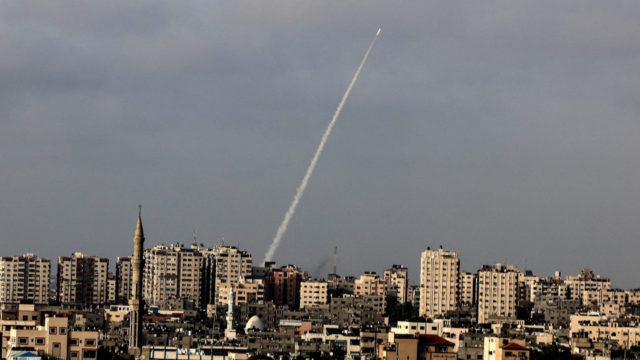Things tend to run together in the Middle East. Right now, Sheikh Jarrah, Palestinian elections, the Hamas-Fatah civil war, the Abraham Accords, U.S. recognition of Jerusalem as the capital of Israel, Iran sanctions, Jerusalem Day, the Meron tragedy, Israel’s electoral issues and American money and diplomacy are all tangled.
If you aren’t willing to untangle them, it’s probably a good idea not to say much, whether you are the Biden administration, a member of Congress or just a journalist attuned to press releases that suit your vision.
Sheikh Jarrah is not the issue, and the underlying land is not “Palestinian.” It was purchased by Jews from Ottoman authorities in the 19th century and was taken from its owners when Jordan illegally occupied the eastern part of Jerusalem in 1948. The Jordanian government’s “Custodian of Enemy Property” took possession, and the Jewish owners reclaimed it by title after 1967. The current lawsuits are between “the owners holding Israeli title and trespassers, squatters and overstaying tenants whose residency began between 20 and 70 years ago.” A final hearing has been postponed because of the violence, but in any event, the Israeli government is not involved and is not expelling Palestinians from “their property.”
So, why now?
Enter the Biden administration. Unable to openly “diss” the Trump administration’s key policy changes or the Abraham Accords, the State Department needed a Palestinian-oriented success to turn Israel’s regional positives into negatives. This was not necessarily intended to result in the horrific violence that it did in fact engender, but was rather intended to lessen Israel’s value as an ally for the U.S. and the Gulf States while Biden simultaneously pursued diplomacy with Iran.
At the same time, the administration—having released hundreds of millions of U.S. dollars to the Palestinian Authority and restored the discredited “two-state solution” to a key role in American Middle East diplomacy—needed something to show for its efforts.
Enter Palestinian elections and the Hamas-Fatah civil war. Palestinian Authority strongman Mahmoud Abbas, in the 16th year of a four-year term, was pressed to schedule elections. However, his unpopularity in the West Bank over corruption and increasingly brutal repression of dissenting voices made Hamas think it might win those elections. And Hamas might have been right. Abbas, the U.S. and Israel began to worry about having a Hamas-led regime in both Gaza and the West Bank.
Unable to cancel elections outright, Abbas decided to blame Israel for curtailing the ability of Jerusalem Palestinians to vote by absentee ballot. He raised the rhetoric sharply. That didn’t work well enough—although three Israeli students were shot, and one was killed leaving their school—so Palestinian worshipers at the Al-Aqsa Mosque were incited to “protect the mosque” and to protest the situation in Sheikh Jarrah. The call to “protect the mosque” is historically a call to violence against Jews—and, indeed, Abbas praised the rioters, declaring “full support for our heroes in Aqsa.” Violence ensued.
Hamas stepped in to take credit for the violence. Hamas leader Ismail Haniyeh warned Israeli Prime Minister Benjamin Netanyahu not to “play with fire. …Neither you nor your army and police can win this battle. What’s happening in Jerusalem is an intifada that must not stop.” Hamas flags were waved in Jerusalem—an oddity, given the hostility of Fatah to Hamas, but acceptable, perhaps, in the context of violence against Israel.
At some point, Hamas decided that incitement of Palestinian individuals was not sufficient. The terrorist group thus fired 400 rockets from Gaza into Israel, beginning Monday—Ashkelon, in Israel’s south, paid a terrible price. Rockets have even landed on the outskirts of Jerusalem.
And Israel has responded.
Enter Israel’s present political conundrum. Following the fourth Israeli election in two years, Prime Minister Netanyahu was unable to form a government. The mandate to do so has since been passed on to another party, Yair Lapid’s Yesh Atid. Both Fatah and Hamas might have thought the Israeli government wouldn’t be able to both manage its electoral issues and maintain national security at the same time. That was a mistake on their part.
Enter Meron. A holiday gathering of Haredi Jews was wildly overcrowded based on the permit it had received, resulting in a stampede that killed 45 people. Israeli government responders were, in at least some cases, attacked by anti-Zionist survivors who do not recognize the government. The resulting tension among various groups is a long way from being worked out. The ensuing Jerusalem Day celebration was fraught with tension that might, again, have encouraged both Hamas and Fatah to think the Israeli government couldn’t cope.
Another mistake on their part. Because now the Israeli government will not back down.
As of this writing, Hamas rockets have been aimed at Tel Aviv, Herzliya, Givatayim, Yavne, Ashkelon, Jerusalem, Holon (where a bus was hit), Netanya and Kadima-Zoran. There are sirens in the Dan Region and across the Israeli south. Hamas immediately announced that 20 people were killed, including nine children—this is the part where journalists have to be careful whose press release they quote. Other, non-Hamas reports indicate that the deadly rocket in question was itself launched by Hamas but failed to clear the Gaza border.
This war began, in some measure, because of Palestinian miscalculations. As Israel retaliates, the White House and the State Department should ensure that Hamas and Fatah understand their mistake.






